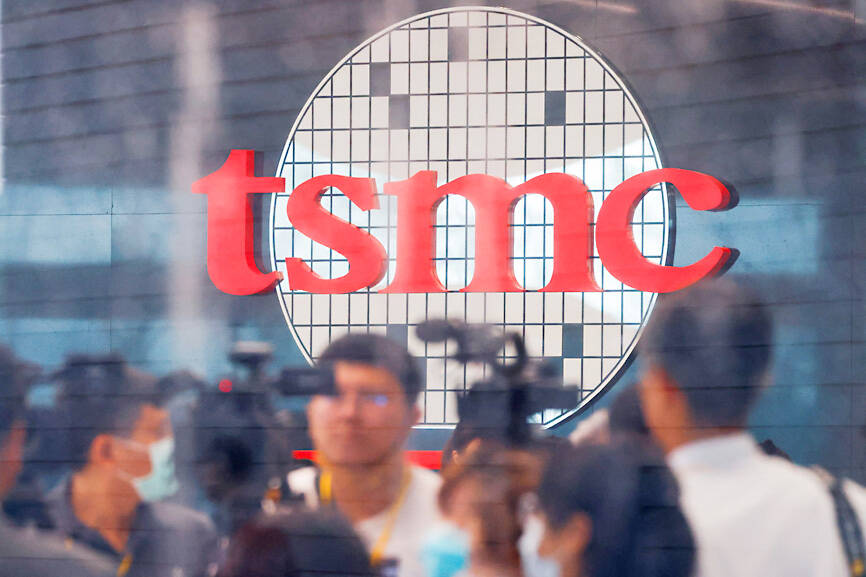Taiwanese companies have been scaling back their investments in China so far this year to just 11 percent of the nation’s total outbound direct investment, the lowest share in decades and well below their heavy spending in the US and Germany, the Nikkei Asia reported yesterday.
During the first 11 months of this year, Taiwan’s approved outbound investment soared 87 percent annually to US$25.7 billion, while investment in China plummeted 34 percent year-on-year to US$2.96 billion, about 11 percent of the total, statistics released by the Ministry of Economic Affairs on Wednesday last week showed.
China had been the biggest investment destination for Taiwanese companies, but things changed at the beginning of this year, the ministry said.

Photo: Ann Wang, Reuters
With China-bound investment in decline, China for the first time was replaced by France and dropped to the second-largest outbound investment destination in February.
The decline in China-bound investment extended to the first 11 months of this year.
The Nikkei Asia attributed the drop-off to China’s economic doldrums, as well as the influence of the long-standing and mounting tensions between the two sides.
Taiwanese companies are also finding it harder to conduct business in China amid trade friction between Washington and Beijing that has led to US duties on Chinese goods, the report said.
Taiwanese spending in China has plummeted from a peak of 84 percent in 2010, when Taiwan and China signed the Economic Cooperation Framework Agreement, but even from last year, when China still accounted for 34 percent of outbound investment, the report said.
This year’s total is expected to clock in at less than half of the 30-year low of 28 percent in 1999, it said.
Meanwhile, investment in Europe and the US has skyrocketed.
Taiwanese foreign direct investment in the US surged ninefold in the first 11 months of this year to US$9.64 billion, making up 37 percent of the total, the report said, citing the ministry’s statistics.
Spending in Germany alone soared past the China figure, ballooning 25-fold to US$3.9 billion, driven by Taiwan Semiconductor Manufacturing Co’s (台積電) investment in a new fab in Dresden, it said.
With China’s economy still stagnating and the Washington-Beijing technology dispute unresolved, Taiwan’s spending in China looks unlikely to bounce back any time soon, the report said.
“Taiwanese investment in China continuing to decline will be the main scenario as long as US-China tensions continue,” Sun Ming-te (孫明德) of the Taiwan Institute of Economic Research (台經院) said.

CHAOS: Iranians took to the streets playing celebratory music after reports of Khamenei’s death on Saturday, while mourners also gathered in Tehran yesterday Iranian Supreme Leader Ayatollah Ali Khamenei was killed in a major attack on Iran launched by Israel and the US, throwing the future of the Islamic republic into doubt and raising the risk of regional instability. Iranian state television and the state-run IRNA news agency announced the 86-year-old’s death early yesterday. US President Donald Trump said it gave Iranians their “greatest chance” to “take back” their country. The announcements came after a joint US and Israeli aerial bombardment that targeted Iranian military and governmental sites. Trump said the “heavy and pinpoint bombing” would continue through the week or as long

TRUST: The KMT said it respected the US’ timing and considerations, and hoped it would continue to honor its commitments to helping Taiwan bolster its defenses and deterrence US President Donald Trump is delaying a multibillion-dollar arms sale to Taiwan to ensure his visit to Beijing is successful, a New York Times report said. The weapons sales package has stalled in the US Department of State, the report said, citing US officials it did not identify. The White House has told agencies not to push forward ahead of Trump’s meeting with Chinese President Xi Jinping (習近平), it said. The two last month held a phone call to discuss trade and geopolitical flashpoints ahead of the summit. Xi raised the Taiwan issue and urged the US to handle arms sales to

State-run CPC Corp, Taiwan (CPC, 台灣中油) yesterday said that it had confirmed on Saturday night with its liquefied natural gas (LNG) and crude oil suppliers that shipments are proceeding as scheduled and that domestic supplies remain unaffected. The CPC yesterday announced the gasoline and diesel prices will rise by NT$0.2 and NT$0.4 per liter, respectively, starting Monday, citing Middle East tensions and blizzards in the eastern United States. CPC also iterated it has been reducing the proportion of crude oil imports from the Middle East and diversifying its supply sources in the past few years in response to geopolitical risks, expanding

Pro-democracy media tycoon Jimmy Lai’s (黎智英) fraud conviction and prison sentence were yesterday overturned by a Hong Kong court, in a surprise legal decision that comes soon after Lai was jailed for 20 years on a separate national security charge. Judges Jeremy Poon (潘兆初), Anthea Pang (彭寶琴) and Derek Pang (彭偉昌) said in the judgement that they allowed the appeal from Lai, and another defendant in the case, to proceed, as a lower court judge had “erred.” “The Court of Appeal gave them leave to appeal against their conviction, allowed their appeals, quashed the convictions and set aside the sentences,” the judges